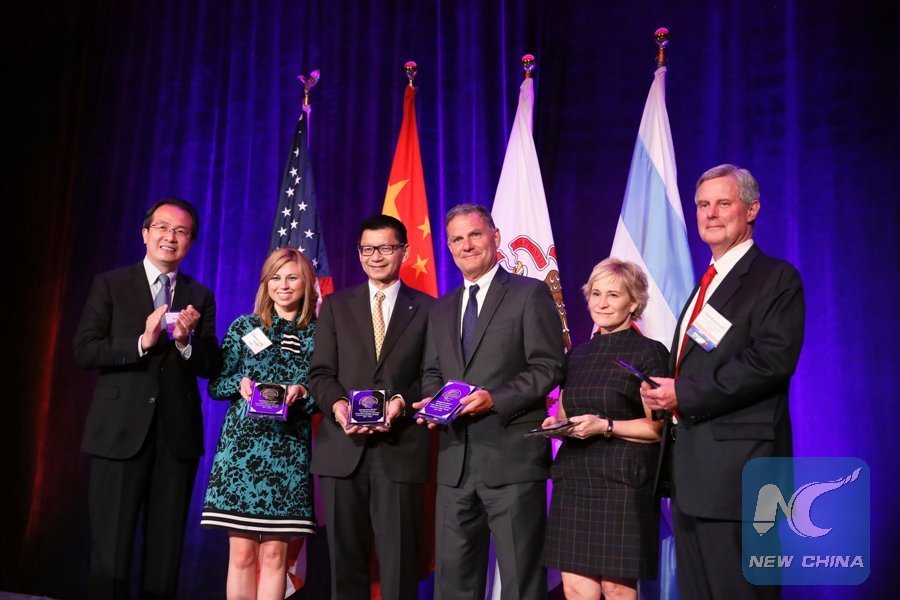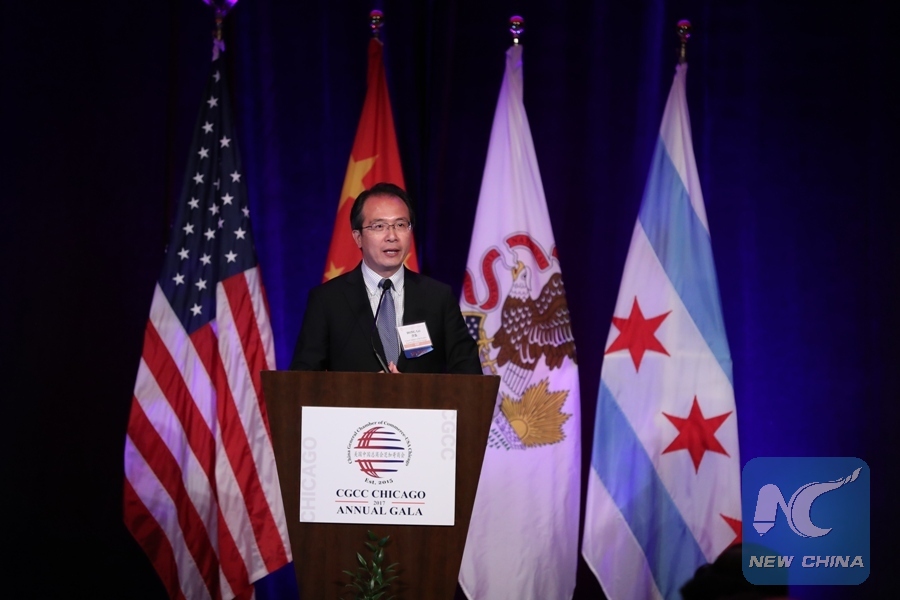
Chinese Consul General in Chicago Hong Lei (1st L) poses for photos with guests in Chicago, the United States, June 29, 2017.(Xinhua/Wang Ping)
CHICAGO, June 30 (Xinhua) -- The China General Chamber of Commerce - Chicago (CGCC) held its second annual gala celebrating relations between the U.S. Midwest and China here on Thursday.
The gala included an award ceremony recognizing individuals and corporations that have contributed significantly to increasing Chinese industry and relations in the Midwest.
The CGCC recognized corporations such as Boeing, SAIC USA, and Wanxiang for bringing industry, innovation, and jobs to the Midwest region.
BOOMING CHINA-U.S. TRADE
In his opening remarks, CGCC Chairman Ni Pin introduced that in the past 16 years, Chinese companies have invested 20.3 billion dollars in nine U.S. Midwest states, creating over 45,000 jobs.
China is the largest trading partner and the third largest export market for the United States. According to the U.S.-China Business Council, China is the fastest-growing market for U.S. exports, with services to China growing by 301 percent and U.S. exports of goods increasing by 114 percent from 2006 to 2015.
"These are exciting times for U.S.-China relations, and it is crucial that both sides continue working together," Ni said.
"I hope that this event can help provide positive outcomes for both the U.S. and China business communities, creating more jobs and trade to boost economic growth in both countries."

Chinese Consul General in Chicago Hong Lei addresses the gala in Chicago, the United States, June 29, 2017. (Xinhua/Wang Ping)
100-DAY PLAN BETWEEN CHINA & U.S.
A "New Era - Opportunities & Challenges in the U.S.-China Economic Cooperation" forum was also held during the gala, which falls within the timeframe of the 100-day plan agreed on by Chinese President Xi Jinping and U.S. President Donald Trump that focuses specifically on promoting U.S. export to China, boosting trade cooperation, and attracting Chinese investment into the U.S. Midwest region.
"The two leaders have pointed a clear direction and laid the foundation for China-U.S. economic cooperation in the new era," Chinese Consul General in Chicago Hong Lei said.
"The political and business communities from both sides have focused on deepening economic cooperation between our two countries, carried out in-depth and pragmatic exchanges of view, and achieved a number of positive results," he said.
Chicago Mayor Rahm Emanuel has focused on increasing Chinese investment into Chicago during his time in office. Since becoming mayor, Emanuel traveled to China twice, signing economic agreements with eight Chinese cities, namely Beijing, Shanghai, Tianjin, Shenyang, Qingdao, Hangzhou, Wuhan, and Chengdu.
"This agreement makes Chicago and the eight (Chinese) cities gateways for investment between the two countries. I've worked hard to make this agreement successful and I'm pleased we have seen record-breaking investment from Chinese companies each year since it was signed," Emanuel said.
Along with business opportunities, Emanuel made an effort to promote Chinese culture in Chicago.
"From opening two new tourism offices in Chengdu and Guangzhou, elevating Chicago's Chinese New Year celebration with the goal of making it the biggest celebration in the U.S., to hosting numerous Chinese officials, including Vice Premiers Wang Yang and Liu Yandong, I have worked to make Chicago as friendly to China as possible," he said.
"The U.S.-China relationship is simply too important not to get right. We have no choice but to succeed in this critically important economic new balancing endeavor, and for that we are going to need all hands on deck," Senior White House Commercial Advisor Eric Branstad said at the gala.
U.S. Secretary of Commerce Wilbur Ross sent his remarks to Ni explaining that he and Treasury Secretary Steve Mnuchin have been working to develop the 100-day plan between the United States and China with specific action items for the short term.
"The plan has already yielded an 'early harvest' on the issues of exports of American beef, liquefied natural gas, and agricultural biotech products, along with market access for American financial service providers," Ross wrote.
Former Treasury Secretary Henry Paulson was awarded Outstanding Contribution to U.S.-China Relations for his work with China's top political and business leaders.
COMPANIES AWARDED
Leading commercial jetliner manufacturer Boeing won the award for Best Export Company. Nearly 500 Boeing 737 jets, including the 191 that went to Chinese airlines in 2015, are serving China's growing middle class that is already as large as the U.S. population.
Boeing expects that over the next 20 years 6,800 planes will be sold in China. Boeing plans on investing and creating jobs in China, as well as transferring technology to a Chinese state-owned company.
SAIC Motor won the award for Best Chinese Company for Innovation. SAIC USA covers international trade, logistics, manufacturing, investment, research and development. In North America, SAIC USA established branches in Michigan, California, Texas, and Mexico.
SAIC USA also set up an innovation center at Silicon Valley, collaborating with Stanford University and MIT, investing in technology startups, and developing advanced technologies like automated vehicles and artificial intelligence.
Another global player in the automotive and technology industries is Wanxiang Group, which won Best Chinese Company for Community Service. Wanxiang America invests in automotive, clean energy, and real estate markets, and employs over 18,000 people.
Wanxiang participated in the "100,000 Strong" initiative started by then U.S. President Barack Obama, sponsoring high school and college students in the Unite States to study Chinese language and culture, as well as to learn clean energy sciences. Wanxiang has also supported over 1,000 U.S. students to study in China, partnering with Chicago Public Schools and 15 other schools and organizations in nine U.S. states.
The China General Chamber of Commerce - USA said it expects the gala to return to Chicago next year at a bigger venue as relations between the United States and China continue to grow, especially in the Midwest.

